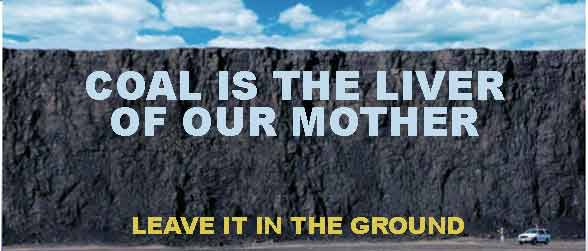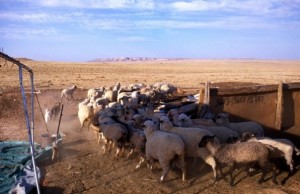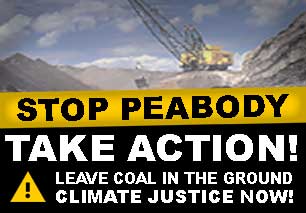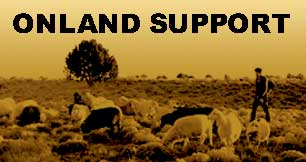Statement of Navajo elder and relocation resister Pauline Whitesinger- May 2011
Hello, my name is Pauline Whitesinger. I am an Edgewater Clan, born for Apache clan. I am Navajo or “Din4”. I am up in the years, i don’t know how old exactly.
The place where I am standing has been subject to a “Land dispute”. So they drew a line around us. I was told to move out by the government. I do not wish to leave so I am staying here. They also have been mining coal around here and they want to do it right here where i live but i will not get out of their way. I do not support the mining. That is what I have been dealing with.
These days I am hearing that they have more money available for Relocation. New funds are available for people who will sign away their ancestoral birthrights. I am so tired of hearing it. I have been to the Capter meeting last week and told them to quit saying it. We have no strong leaders for us as relocation resistors in the Tribal Government. There must be something wrong with this thing they call “elections”. The only people who ever seem to win are the ones who say “I will eat the earth. I will have the earth dug up and ripped to shreds.”
We have our own meetings from time to time as a community of relocation resisters. They seem to draw a lot of attention from the BIA, FBI, and “homeland security”. But I still believe that we deserve to have such meetings and we will continue to organize them.
There are impoundments going on right now out here. The “Rangers” are hauling off a lot of Navajo horses and cows. Whatever reason they come up with, it costs us a lot of time and $ and harms the livestock. I am fed up with it. And then the other day a bunch of trucks and trailers came out and stole a lot of scerap metal from my family. Maybe it was the rangers. In either case we are in need of lookouts and security to defend our livelihood. We don’t get any help from the BIA. They are the ones who are doing it to us.
Even among those of us with the line drawn around us there is inequality now. Those of us who did not sign the “Accomodation Agreement in 1997 are having a hard time while signers drive around in a fancy truck with a big water barrel and suck up all the water out of the well. Why not herd your sheep down to drink instead of hauling water to them?
I live in the way that my mother and father lived. Caring for the herds, the garden and the sheep. Who will help me with the work it entails? The Rangers?
I heard on the news recently of the assassination of one of our leaders overseas. Let’s have all of our native youth that are fighting over there return home immediately.
I live by myself for the most part. And there is a lot of work here with no running water or electricity, herds of sheep, goats, cows and horses. Two cornfields. My children have relocated, mostly because they are ill with diabetes and have to go to dialysis in the cities. They live several hours drive from me in different directions. My grandkids, some of them are very capable helpers, but they have been harrassed and chased off by the rangers. So they don’t stay very long.
So I havε sheepherders and other types of helpers come and stay with me sometimes. Some of them work very hard to learn the life out here and some stay with me all winter long. Right now i am looking at another summer alone and I wish it were not so. I am inviting you supporters to come and help me with the work here and to keep in the way of the BIA that wants us Navajos off of Black Mesa. Bring whatever strange foods you eat and I will sample it for you. Some of it I even like. And you are welcome to eat Navajo food at my table. A lot of people have said a lot of stuff about Big Mountain over the years and i think most of it is lies. Come out and see for yourself.
And a big THANK YOU to all supporters for the work that you do. Ahehee!!!
All mail correspondence to:
Pauline Whitesinger,
P.o.Box 973
Hotevilla, AZ, 86030
Translated and transcribed by Owen Johnson stubx@yahoo.com
Support Front-Line Indigenous Communities of Black Mesa, AZ Resisting Massive Coal Mining!
Join the Caravan in Support of Indigenous Communities Who Are in Their Fourth Decade of Resisting Massive Coal Mining Operations on Their Ancestral Homelands of Big Mountain & Black Mesa, AZ. November 19th – 26th, 2011
Communities of Black Mesa Have Always Maintained That Their Struggle for Life, Land, & Future Generations Is For Our Collective Survival.
Greetings from Black Mesa Indigenous Support,
We are excited to once again extend the invitation from Dineh resisters of the Big Mountain regions of Black Mesa in joining a caravan of work crews in support of the on-going struggle to protect their communities, ancestral homelands, future generations and planet that we all share. These communities are in their fourth decade year of resistance against the US Government’s forced relocation policies, Peabody Coal’s financial interests, and an unsustainable fossil fuel based economy.
Participating in this caravan is one small way in supporting these courageous communities who are serving as the very blockade to massive coal mining on Black Mesa. The aim of th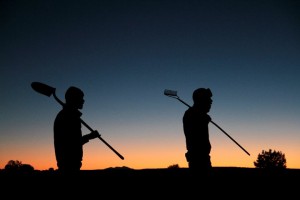 is caravan is to honor the requests and words of the elders and their families. With their guidance we will carry their wishes & demands far beyond just the annual caravans and link this struggle with social, environmental, and climate justice movements that participants may be a part of.
is caravan is to honor the requests and words of the elders and their families. With their guidance we will carry their wishes & demands far beyond just the annual caravans and link this struggle with social, environmental, and climate justice movements that participants may be a part of.
By assisting with direct on-land projects you are supporting families on their ancestral homelands in resistance to an illegal occupation and destruction of sacred sites by Peabody Energy. We will be chopping and hauling firewood, doing minor repair work, hauling water, road maintence, offering holistic health care, and sheep-herding before the approaching freezing winter months.
Indigenous nations are disproportionately targeted by fossil fuel extraction & environmental devastation; Black Mesa is no exception. Peabody Energy, previously Peabody Coal Company (the world’s largest private-sector coal company) is continuing to scheme for ways to continue their occupation of tribal lands under the guise of extracting “clean coal”.
Peabody’s Black Mesa mine has been the source of an estimated 325 million tons of greenhouse gases that have been discharged into the atmosphere.* In the 30+ years of disastrous operations, Dineh and Hopi communities in Arizona have been ravaged by Peabody’s coal mining. As a result of the massive mining operation, thousands of families have had their land taken away and been forcibly relocated. Peabody has drained 2.5 million gallons of water daily from the only community water supply and has left a monstrous toxic legacy along an abandoned 273-mile coal slurry pipeline. Furthermore, Peabody has desecrated & completely dug up burials, sacred areas, and shrines designated specifically for offerings, preventing religious practices. The continued mining by Peabody has devastating environmental and cultural impacts on local communities and significantly exacerbates global climate chaos.
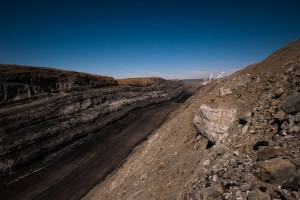
Relocation laws have made it nearly impossible for younger generations to continue living on their homelands. Institutional racism has fueled neglect and abandonment of public services such as water, maintenance of roads, health care, and schools. Many of the residents in the regions of Black Mesa that we’ll be visiting are elderly and winters can be extremely rough on them in this remote high desert terrain. Due to lack of local job opportunities and federal strangulation on Indian self-sufficiency, extended families are forced to live many miles away to earn incomes and have all the social amenities (which include choices in mandatory American education).
It is increasingly difficult for families to come back to visit their relatives in these remote areas due to the unmaintained roads and the rising cost of transportation. As one of their resistance strategies they call upon outside support as they maintain their traditional way of life in the face of the largest relocation of indigenous people in the US since the Trail of Tears.
Drawing on the inspiration of the elders & families of Black Mesa, they offer us a transformative model for the strategic, visionary change that is needed to re-harmonize our relationships with one another and with the planet. But too often Black Mesa becomes invisibilized as other human rights, environmental justice and climate justice struggles are showcased and highlighted in both the mainstream & progressive media.The truth is that all of these struggles are interconnected and central to our collective survival is the need to increase the visibility of struggles such as Black Mesa, a decades-long indigenous-led resistance to the fossil fuel industry, in related movements for human rights, environmental, climate & social justice.
May we stand strong with the elders & families of Black Mesa in their declaration that “Coal is the Mother Earth’s liver” and join them in action to ensure that coal remains in the ground! Families of Black Mesa are determined to repair and end the devastating impacts of colonialism, coal mining, and forced relocation of their communities, sacred lands, and our planet. False solutions to climate change and large scale coal extraction must be stopped!
Forging links between people grounded in movements based on social and ecological justice and the Black Mesa resisters (who are also grounded in these movements) is essential to address the disproportionate problems of poverty and disenfranchisement to achieve social, environmental, & climate justice.
On-Going Resistance To The Continued Desecration Of The Sacred San Francisco Peaks:
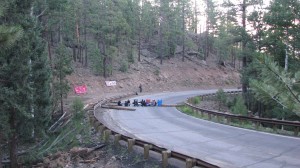 The struggle to protect the San Francisco Peaks is part of an international movement to protect sacred sites and is intricately connected with the struggle to protect the sacred places of Big Mountain & Black Mesa, AZ. The San Francisco Peaks has considerable religious significance to thirteen local Indigenous nations (including the Havasupai, Dine’ {Navajo}, Hopi, and Zuni.) In particular, it forms the Dine’ sacred mountain of the west, called the Dook’o’oosłííd.
The struggle to protect the San Francisco Peaks is part of an international movement to protect sacred sites and is intricately connected with the struggle to protect the sacred places of Big Mountain & Black Mesa, AZ. The San Francisco Peaks has considerable religious significance to thirteen local Indigenous nations (including the Havasupai, Dine’ {Navajo}, Hopi, and Zuni.) In particular, it forms the Dine’ sacred mountain of the west, called the Dook’o’oosłííd.
In recent months the San Francisco Peaks has been desecrated by Arizona Snowbowl Ski Resort with permission from the US Forest Service by cutting 40 acres of pristine forest and laying miles of pipeline to spray artificial snow made of sewage water that would be bought from the City of Flagstaff. In response, there has been a convergence on the peaks to protect what has yet to be desecrated and create a long term form of protection for the Mountain including demonstrations, encampments, multiple lockdowns, further litigation, and tribes filing a human rights complaint with the United Nations.
If you’re visiting Black Mesa, then you will be likely be traveling through the vicinity of the holy San Francisco Peaks which is located just outside of Flagstaff, AZ. Stay posted for updates & how you can support the protection of the Peaks at http://www.truesnow.org and http://www.indigenousaction.org
Support the Action in Stopping the American Legislative Exchange Council (ALEC) “States & Nation Policy Summit” in Scottsdale, AZ; Nov 30 – Dec 2, 2011:
ALEC- a conglomerate of legislators and corporate sponsors is planning to meet for their “States and Nation Policy Summit” just outside of Phoenix, AZ (Scottsdale) from November 30-December 2, 2011 . “The group’s membership includes both state lawmakers and corporate executives who gather behind closed doors to discuss and vote on draft legislation. ALEC has come under increasing scrutiny in recent months for its role in crafting bills to attack worker rights, to roll back environmental regulations, privatize education, deregulate major industries, and pass voter ID laws”.** Arizona politicians and the private prison industry, under ALEC, finalized the model legislation which became SB 1070, the harshest anti- immigrant measure in the country and a license for racial profiling.
Thanks to ALEC, at least a dozen states have recently adopted a nearly identical resolution asking Congress to compel the U.S. Environmental Protection Agency to stop regulating carbon emissions (which they recently did): http://www.democracynow.org/2011/9/7/smog_v_jobs_is_obama_admin”.
A Peabody Energy representative is on the Corporate Board of ALEC. Kelly Mader, the Vice President of State Government Affairs at Peabody was given ALEC’s 2011 Private Sector Member of the Year Award. In these closed door ALEC meetings, it is no wonder that corporations such as Peabody serve state legislators their agendas on legislation which directly benefit their bottom line. Mader is due to attend the ALEC meeting in Phoenix.
Families of Black Mesa may need supporters to watch over their home and animals so that they can attend the ALEC demonstrations. Please contact BMIS if you can help with this as well as additional logistics such as funds, transportation, and lodging. Thank you!
The struggles on Big Mountain are directly connected to the struggles on the San Francisco Peaks and the movement to stop ALEC. Stay tuned for possible actions and protests in support of struggles to protect ancestral homelands & sacred sites, to stop corporate profiteering off the exploitation, suffering and degradation of us all -particularly indigenous peoples, migrants, the working class, prisoners, and essentially all of Mother Earth.
“Arizona Says NO to Criminalization, Incarceration, & Corporate Profiteering at the Expense of Our Communities” http://azresistsalec.wordpress.com/ *
For additional info on ALEC: http://alecexposed.org/wiki/ALEC_Exposed
Ways you can support:
- Join the Caravan: Connect with a coordinator or create a work crew in your region. Contact BMIS so that we can connect you with others who may be in your region. So far caravan coordinators are located in Prescott, Phoenix and Flagstaff, AZ; Denver, CO; Santa Cruz, CA; Eugene and Portland, OR; and the San Francisco’s Bay Area. Meeting locations and dates will be posted on the BMIS website & our facebook page as coordinators set them up. This caravan will be in collaboration with the annual Clan Dyken Fall Food and Supply Run on Black Mesa. It is of the utmost importance that each guest understands and respects the ways of the communities that we will be visiting. Prior to visiting Black Mesa, all guests must read and sign the Cultural Sensitivity & Preparedness Guide: https://supportblackmesa.org/tag/cultural-sensitivity/
-
BMIS List of Regional Coordinators for the Fall 2011 Caravan
- Flagstaff, AZ: Beth elavely@gmail.com
- Albuquerque, NM: Derek blackmesais@gmail.com
- Prescott, AZ: Ian Christopher grey.sky.magpie@gmail.com
- Santa Cruz, CA: sheepandsagebrush@gmail.com
- Bay Area, Ca: bayareacaravan@gmail.com
- Denver, CO: Shannon rezchix@gmail.com & Leah misskittiedee@hotmail.com
- Maine: Emma emma@beehivecollective.org
- Minneapolis, MN: Kelly nancydrew@riseup.net
- Eugene, OR: OR4BlackMesa@gmail.com
- Host or attend regional organizational meetings in your area: We strongly urge participants to attend or organize regional meetings. Due to the large number of caravan participants in past years, we are limiting the number to just under 100 this fall. Please register early and plan on attending meetings held in your region. There you’ll engage in political education work and help regional coordinators plan logistics, fundraisers, and collect donated food and supplies ahead of time.
- Trucks, chainsaws, & supplies are integral to the success of the caravan. The more trucks we have, the more wood, water and other heavy loads we can transport. Axes, mauls, axe handles, shovels, tools of all kinds, organic food, warm blankets, and did we mention trucks? — either to donate to families or to use for the week of the caravan–are greatly needed on the land to make this caravan work! We’ve got a 501-C3 tax-deductible number, so if you need that contact us. Please keep checking the BMIS website for an ongoing list of specific requestsby Black Mesa residents.
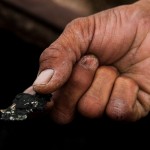
- Challenge Colonialism! One of our main organizing goal’s is to highlight anti-colonial education within all the regional meetings leading up to the caravan. In addition to the Cultural Sensitivity Guide, we encourage you to bring articles, films, and other resources to your regional meetings & host discussions that further our collective understanding for transforming colonialism, white supremacy, genocide, & all intersections of oppression. We have started a resources list, which is now on the website. Feel free to share with us any resources that you like so that we can build upon this list & strengthen our growing support network! In addition please check out our Points Of Unity.
- Fundraise! Fundraise! Fundraise! As a grassroots, all-volunteer network, we do not receive nor rely on any institutional funding for these support efforts, but instead count on each person’s ingenuity, creativity, and hard work to make it all come together. We are hoping to raise enough money through our community connections for gas, specifically for collecting wood and food for host families, and for work projects. Host events, hit up non-profits, generous food vendors, and folks in your own networks. An article that we want to highlight is ‘8 Ways to Raise $2,500 in 10 Days’. Check our website soon for our this document, fundraising guidelines, a donation solicitation template letter, and more. You can Donate here: https://supportblackmesa.org/donate/
- Stay with a family any time of the year: Families living in resistance to coal mining and relocation laws are requesting self-sufficient guests who are willing to give three or more weeks of their time, especially in the winter. Contact BMIS in advance so that we can make arrangements prior to your stay, to answer any questions that you may have, and so we can help put you in touch with a family. It is of the utmost importance that each guest understands and respects the ways of the communities that we will be visiting. Prior to visiting Black Mesa, all guests must read and sign the Cultural Sensitivity & Preparedness Guide: https://supportblackmesa.org/tag/cultural-sensitivity/
Give back to the Earth! Give to future generations!
May the resistance of Big Mountain and surrounding communities on Black Mesa always be remembered, and supported!
With love,
Black Mesa Indigenous Support
Black Mesa Indigenous Support (BMIS) is a grassroots, all-volunteer collective committed to supporting the indigenous peoples of Black Mesa in their resistance to massive coal mining operations and to the forced relocation policies of the US government. We see ourselves as a part of a people powered uprising for a healthy planet liberated from fossil fuel extraction, exploitative economies, racism, and oppression for our generation and generations to come. BMIS stands with the elders of Black Mesa in their declaration that “Coal is the Mother Earth’s liver” and joins them in action to ensure that coal remains in the ground.
Address: P.O. Box 23501, Flagstaff, Arizona 86002
Voice Mail: 928.773.8086
Email: blackmesais@gmail.com
Web: www.supportblackmesa.org
Facebook: Black Mesa Indigenous Support
*Black Mesa Water Coalition
**Democracy Now!
Collective Liberation: Lessons Learned in Allyship with Indigenous Resistance at Black Mesa
Cross Posted from Left Turn Magazine
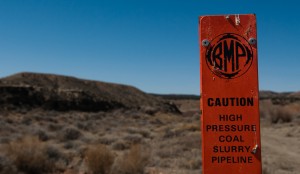
One of the signs that mark the slurry pipeline in Black Mesa, Arizona. The pipeline had carried coal from the Black Mesa Mine to the Mohave Generating Station in Laughlin, Nevada. Both the mine and the powerplant have since closed. Photo: Jonathon LeFaive
Public Law (PL) 93-531, written by Barry Goldwater and Pat Fannin and commonly known as the “Relocation Law,” was signed into law by Gerald Ford in 1974. The statute made 900,000 acres of Navajo-Hopi shared land exclusive Hopi territory, or Hopi Partitioned Lands (HPL), despite the fact that very few Hopi lived there. With this, the Department of Justice began the massive relocation of Dineh, and Peabody Energy Corporation began constructing the two largest strip mines in the western US, one of which is operating today. The effects of the relocation meet all the criteria of the UN’s internationally recognized definition of cultural genocide.
The media has misrepresented this corporate land grab as a “Navajo-Hopi Land Dispute.”
“It is a major human rights violation, they way they pitted the Hopi and Dineh against each other over this issue,” says NaBahe Katenay Keediniihii (Dineh), who was born on the HPL. “For generations,” he continues, “they co-existed peacefully despite the fact that they were different tribes with different languages, ceremonies, and traditions.”
More than 14,000 Dineh and over 100 Hopi have been relocated from the land surrounding the sacred peaks of Big Mountain to make way for Peabody’s mines. This constitutes the largest forced relocation of indigenous peoples in the US since the Trail of Tears in 1883. In the 1970s and 1980s, resistance communities armed themselves against law enforcement officers and cut the government-erected barbed wire fences demarking the sacred places they were no longer allowed to visit. Of this, elder matriarch Pauline Whitesinger said, “They drew a line around us. I was told to move out by the government. I do not wish to leave, so I am staying here.”
The relocation has a profoundly complicated history, much of which the authors of this piece are not capable of describing, as it is not our struggle. Currently, most families live in traditional hogans on large homesteads peppered by scrubby juniper and pine trees throughout which they herd their livestock. Sheep comprise the lifeblood of traditional Dineh communities. Now, as a result of 30 years of coal slurry operations that have required millions of gallons of water a day to function, the Navajo Aquifer, which runs under Black Mesa and supplies water for crops, people, and animals, is all but drained.
From its 30 years of disastrous operation, Peabody’s 103-square-mile Black Mesa mine left a toxic legacy along an abandoned coal slurry pipeline 273 miles long, the source of an estimated 325 million tons of climate pollution discharged into the atmosphere. According to Peabody, the operating Kayenta Mine continues to extract eight million tons of low-sulfur coal annually and supplies the Navajo Generating Station near Page, Arizona.
These days, the Dineh families and elders who remain on the HPL face regular harassment and impoundment of livestock. Elder matriarch resister Mae Tso said recently, “Under the relocation laws we can only have a certain amount of sheep. They may extend [impoundments] to twice a year. It seems the Navajo and Hopi leadership have come together to push more people off of the HPL.”
Movement building and allyship
Formed in 1998, Black Mesa Indigenous Support (BMIS) is committed to decolonial solidarity work with the Dineh communities, who are resisting this ongoing forced relocation by the US government. We are an all-volunteer, grassroots collective comprised of antiracist white organizers, the majority of whom are female-identified; we are involved as herbalists, parents, farmers, teachers, artists, and climate justice organizers. We see our role in working with other white allies as being particularly important because we believe, as the People’s Institute for Survival and Beyond phrases it, “Racism is the single most critical barrier to building effective coalitions for social change.”
Indigenous peoples’ resistance, history and perspective on land, sovereignty, and the nation-state comprise the nexus of our work. We seek to be a part of countering the myth of the “disappearing native,” while supporting active and resilient indigenous-led resistance movements and engaging in our own decolonization and healing processes.
Since the relocation began, and before BMIS existed, support has taken various forms: American Indian Movement resistance camps, weavers for justice, and organizing speaking tours around the country for elders, including visits to the UN. Over the years, people who have supported the struggle on Black Mesa have come to understand the fundamental interconnectedness of hierarchy and oppression, as well as varying relationships to power and privilege. The supporter network is now multigenerational and weaves together other efforts towards social and environmental justice.
As we develop as a collective, BMIS is increasingly focusing on movement and coalition building. In working to get supporters to the land to learn directly from the traditional ways and resistance of the community, we are also building a regional coordinator network of allies organizing year-round support of Black Mesa in their home communities.
Climate connections
At the United Nations COP-16 climate talks in Cancún in December 2010 it became clear that increasingly secured borders between the Global North and the Global South, between rich and poor, will ensure corporate access to remaining natural resources. Resisters from Black Mesa and others from frontline communities demanded the root causes of climate change be addressed, calling for the implementation of the rights of Mother Earth. The UN silenced them, while refusing to make real commitments to stop emissions at the source and keep fossil fuels in the ground.
The communities and lands most impacted by climate change have been plagued with the externalities of unfettered natural resource extraction fueling free-market capitalism: higher rates of cancer, respiratory diseases, and landbases and cultures rendered “sacrifices,” as is the case with Black Mesa. Today around Black Mesa, there are unified efforts between Dineh and Hopi against resource extraction and for green jobs. BMIS seeks to support local communities’ transitions off dirty energy and support green jobs for people who’ve been most impacted by dirty energy and climate pollution—disproportionally people of color and indigenous peoples.
The BMIS support network also connects with indigenous-led movements regionally and is part of the growing resilience movement for protecting sacred places: the Save the Peaks campaign in Flagstaff, Arizona that is organizing to preserve the San Francisco Peaks (www.savethepeaks.org) a sacred altar to indigenous peoples, including the Dineh; and the campaign to protect Segora Te (Glen Cove) (www.protectglencove.org) in California, among others.
As the regional support network grows, the importance of building an analysis of cultural and spiritual appropriation, and accountable representation for non-indigenous supporters becomes integral to our organizing. We work to foster committed allyship in movements led by people most impacted by colonialism, racism, and ecological destruction—in this case, the resisting elders of Black Mesa.
We hope that our access to resources can provide some background and open up a space for voices from the resistance communities to be amplified and published more regularly. We’ve learned that locating ourselves within the struggle does not mean making ourselves invisibile or acting from a place of guilt and shame, but acknowledging our unique abilities and positions as opportunities and deep yearnings to connect as a way to fully embody our collective liberation.
Liza Minno Bloom, Hallie Boas, and Berkley Carnine are collective members with Black Mesa Indigenous Support. For BMIS’s points of unity, more extensive background and news, our recently updated cultural sensitivity and preparedness training guide for movement builders, as well as ways to get involved, please visit www.supportblackmesa.org.

